
Here are educational programmes (paid and free) from Arab Academy for Science, Technology & Maritime Transport (AASTMT) that relate to ecosystems/biodiversity. Our 2021-2026 strategic plan has dedicated one of its four main goals to sustainability, where The AASTMT commits to fulfil its societal responsibility and to align itself to the SDGs.
The workshop reviewed the importance of the concept of green tourism, improving ways to benefit from tourism, overcoming obstacles that reduce tourism benefits, and the importance of supporting efforts to involve communities in promoting the concept of green tourism, while improving infrastructure and reducing the side effects of economic activities associated with tourism. It educates participants about ecosystem-based tourism and biodiversity protection.
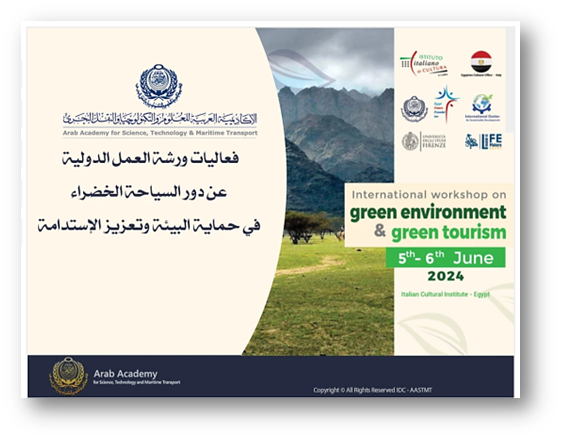
Offers training and collaborative research with communities, industries, and government bodies on environmental monitoring, climate, and sustainability. These activities support public education and awareness on land, water, and air ecosystems.

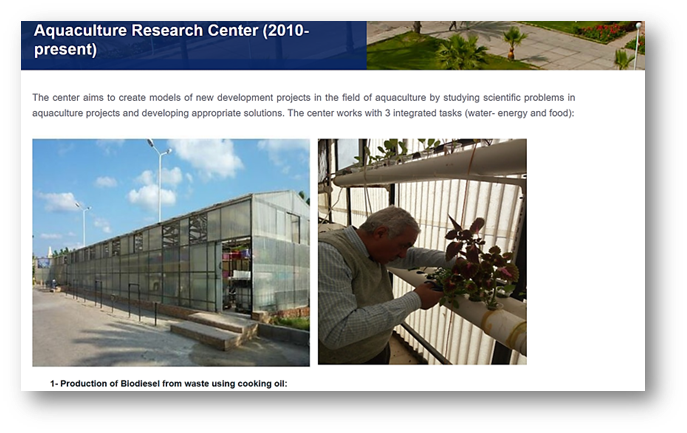
Aquaculture Research Center
Provides IMO model courses and training on managing marine pollution and ecosystem protection. Often includes practical exercises in Abu Qir Bay; typically subsidized or community-accessible.
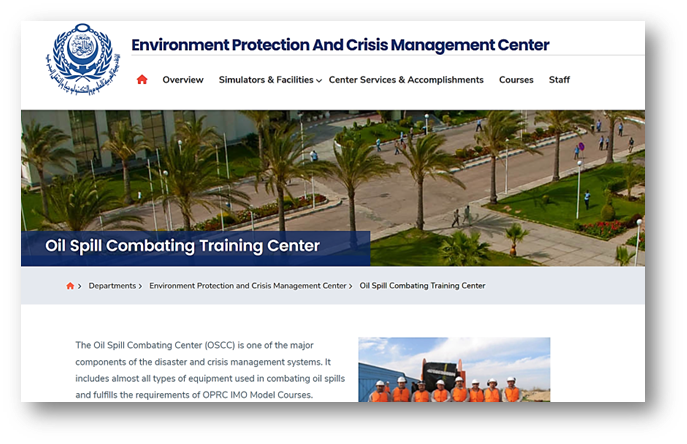
Used for training and education on real-time environmental crisis response (e.g., natural disasters, coastal contamination). Involves scenario-based education relevant to land and marine ecosystems.
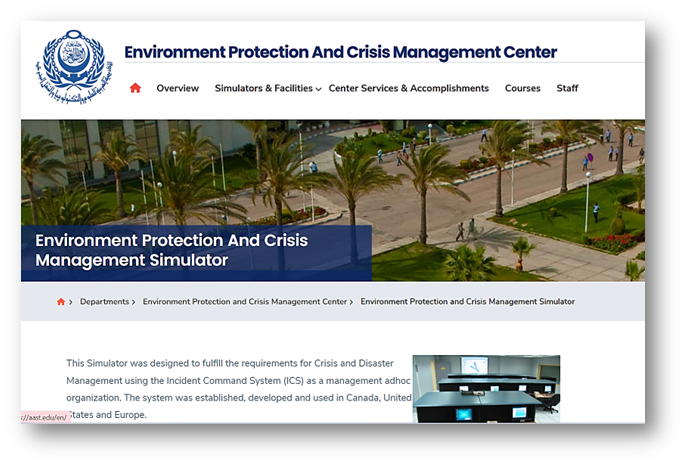
Provides GIS & Remote Sensing training for mapping habitats, land use, and biodiversity changes key to land ecosystem education. Supports community research and environmental awareness.

In January 2023, familiarize the local fishermen with the threats and adverse effects encouraging them to use eco-friendly antifouling paints” which addresses marine ecosystems education.

Provides professional training on offshore environmental safety, marine survival, and pollution control relevant to marine ecosystems. MSI) is dedicated to learning and competency development for the offshore and maritime industry. To achieve the goal of improving the knowledge and performance of offshore and maritime personnel, MSI operates in compliance with the premier quality standards (DNV, ISO 9001:2015) & (DNV, ISO 45001:2018) to implement international training standards such as the International Maritime Organization.

The document is most strongly aligned with SDG 15.2.4, as it demonstrates the integration of biodiversity, ecosystem considerations, and sustainable land-use concepts directly into the academic curriculum across several departments. Courses in transport, logistics, entrepreneurship, energy, and supply chain explicitly incorporate topics such as forest management, desertification, land ecosystem impacts, environmentally responsible operations, and the protection of terrestrial environments. This reflects institutional commitment to embedding biodiversity and land sustainability principles into educational planning and course design.
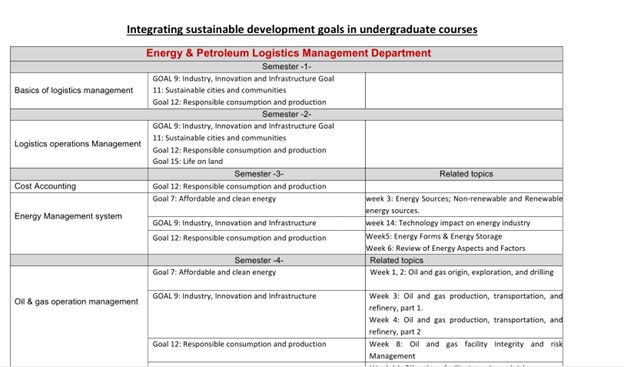
Studies on ecosystems, biodiversity, and environmental management are all part of the AASTMT undergraduate programs Colleges such as the College of Fisheries Technology & Aquaculture provide specialized programs, such as courses on marine biodiversity and sustainable fishing methods.
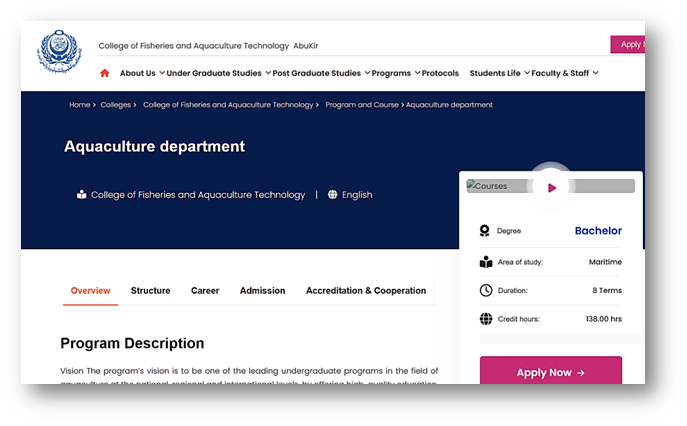
The M.Sc. in Sustainable Management of Fisheries and Aquaculture aims to contribute to scientific research capture fisheries and aquaculture directing innovation.
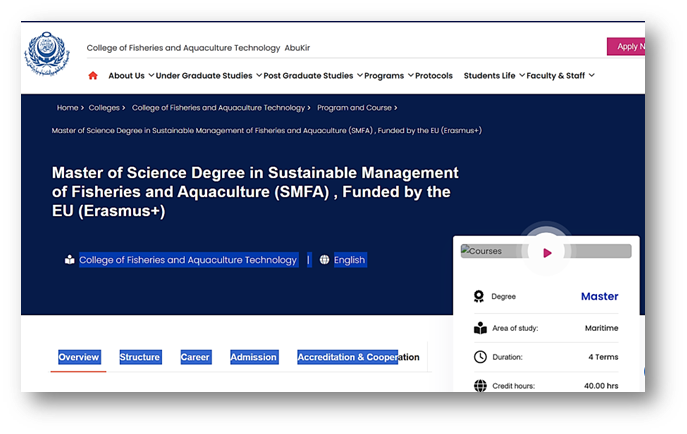
Studies on ecosystems, biodiversity, and environmental management are all part of the AASTMT undergraduate programs, which span several disciplines. Colleges such as the College of Fisheries Technology & Aquaculture provide specialized programs, such as courses on marine biodiversity and sustainable fishing methods. These initiatives are a component of AASTMT's larger dedication to environmental sustainability.
Perspective The program's goal is to rank among the top undergraduate aquaculture schools in the country, the region, and the world by providing top-notch instruction, training, and applied scientific research. Mission The program's goal is to give the aquaculture community the outreach, research, and education it needs.
Bachelor degree on aquaculture on AASTMT webpage
The department is a pioneer in fishing vessel navigation and equipment design, offering graduates qualifications for roles such as alternate officers, navigational surveillance, fisheries observers, and managers. The program adheres to international conventions and IMO requirements, providing marine uniforms and opportunities for marine exercises in regional and international waters.
Bachelor degree in fisheries Technology
The M.Sc. in Sustainable Management of Fisheries and Aquaculture aims to contribute to scientific research in aquatic resources, based on the principles of sustainable management, with the aim of providing solutions to the problems facing the aquatic production sectors in both capture fisheries and aquaculture as well as directing innovation towards finding ways to develop these sectors and make optimal use of aquatic resources.
Postgraduate Studies on AASTMT webpage
This course aims to enhance students' environmental awareness, equipping them with knowledge and skills to positively manage environmental resources and understand the complexity of human activities.
Environmental Science and Technology on AASTMT webpage
The goal of the course is to give participants knowledge, expertise, and understanding regarding applications of renewable energy. Recognize the fundamentals of renewable energy. Pick the appropriate sources of renewable energy. Be familiar with the various renewable energy sources.
Renewable energy system on AASTMT webpage
AASTMT and the Basel Convention Regional Center for Training and Technology Transfer for Arab Countries have signed a cooperation agreement. The agreement aims to develop joint programs, workshops, and enhance cooperation in common areas under the Basel Convention. The agreement also aims to collect and share knowledge, training, and environmental case studies with Arab countries. In order to complete the regional system for sustainable management in accordance with international multilateral agreements for the management of hazardous substances and wastes, the two parties were also eager to gather, assess, and share knowledge, training and awareness initiatives, and successful environmental case studies with all Arab countries. This would allow them to dispose of these materials in an environmentally friendly manner that complies with the International Maritime Organization's (IMO) standards.
Regional Center for Training and Technology Transfer For Arab Countries Agreement on AASTMT webpage
Vlaby is first virtual labs platform for school students in MENA, that allows students and teachers to conduct practical science experiments in a virtual online lab that simulates the traditional science laboratory and has all lab equipment, chemicals, devices, glass tools and other laboratory tools,
Thus, the student can conduct experiments anytime, anywhere and from any device Vlaby Platform on AASTMT news page
In concern of realizing and activating sustainable developments goals, the energy research unit in AAST, Abukir announces the environment day initiative which will take place on Monday the 20th of June, 2021
sustainable development goals, page 52,53 on AASTMT news page
This action plan for 2021/2022 focuses on sustainable practices, policy implementation, waste management and conservation efforts on AASTMT campuses and surrounding communities, ensuring long-term ecosystem use. Schedule and host a series of educational events (webinars, workshops, lectures) on sustainable land use and conservation practices.
4.1 Develop curriculum components on local ecosystems for related study programs.
4.2. Offer free and paid community workshops on understanding and protecting local ecosystems
AASTMT’s Green Horizon Action Plan on the AASTMT web page
AASTMT organizes and hold vocational courses to achieve one of the sustainable development goals (poverty eradication) in order to provide a profession for the youth with the collaboration of NGOs Collaborate of the AASTMT with the NGOs to tackle the SDGsOs_to_tackle_the_SDGs.pdf